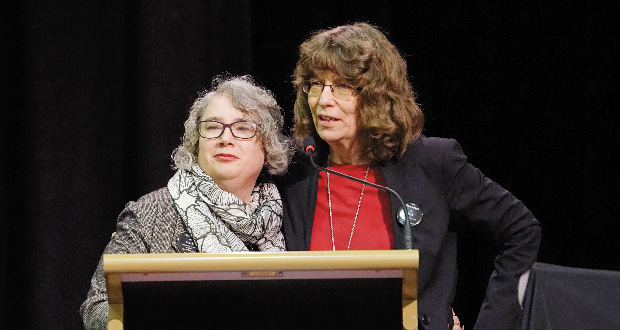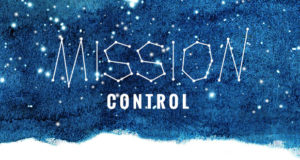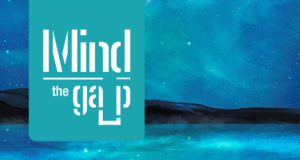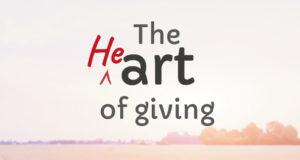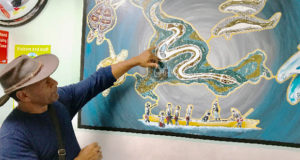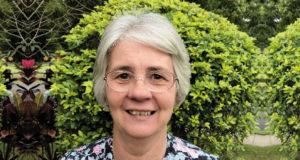Members of the Uniting Church’s 15th Assembly have returned home to share the news of the landmark decisions made at the 15th triennial meeting. Matt Pulford reports.
Over seven days from 8–14 July, more than 260 Assembly members shared prayer, worship and bible studies with ecumenical and interfaith friends, church partners and each other.
Former South Australia Moderator Dr Deidre Palmer was installed as the Uniting Church’s 15th President in a joyous service before shepherding a meeting in which Assembly members voiced a wide range of strongly and faithfully held views on a range of issues, from different biblical, theological and cultural perspectives.
These were some of the important decisions reached:
Marriage and same-gender relationships
After six years of formal consideration and more than 30 years of conversation Assembly members decided to move forward on the issue.
Meeting for the first time since last year’s change to Australian marriage laws, the Assembly resolved to allow Uniting Church ministers and authorised celebrants the freedom to conduct or to refuse to conduct same-gender marriages. They did this by agreeing to hold two equal and distinct statements of belief on marriage to honour the diversity of Christian belief among members.
The Uniting Church’s existing statement of belief on marriage is retained—that “Marriage for Christians is the freely given consent and commitment in public and before God of a man and a woman to live together for life”.
Alongside it, a new additional statement of belief has been adopted; that statement reads, “Marriage for Christians is the freely given consent and commitment in public and before God of two people to live together for life.”
“We affirm both these understandings of marriage as faithful to the gospel of Christ. I want to reassure all members of the Uniting Church—your rights to follow your beliefs on marriage will be respected and protected,” said Dr Palmer.
Church councils will have the right to determine whether marriage services take place on their premises or not. An additional liturgy will be developed for the new statement of belief.
“This decision follows many years of reflection, prayer and discernment, and I want to thank Assembly members for the way they have responded with grace to what is a difficult conversation for many people of faith,” said Dr Palmer who acknowledged the ministry and struggle of LGBTIQ people in the Uniting Church over many years.
“I know that this conversation is painful and difficult for you,” said Dr Palmer, addressing LGBTIQ Church members directly.
“We also acknowledge those who are not able to support this change—and your pain and difficulty in this space. I thank you all for modelling a loving Christian community, holding together and caring for each other, across our diversity of strongly and faithfully held views.”
During the meeting, members heard advice from theological and legal experts and had the opportunity to speak to proposals for and against the changes.
The final proposal on marriage was adopted by a significant majority by formal agreement. An unconfirmed minute of the proposal has been posted on the Assembly website.
A pastoral letter from Dr Palmer has been sent to all congregations and faith communities. A video version of the message is also now available as are translations into community languages. Past President Rev Prof Andrew Dutney has also shared a theological reflection on unity in diversity.
As the first mainstream denomination to deliver the decision there has been some media attention; Dr Palmer explained the decision to Noel Debien on the ABC’s Religion and Ethics Report.
A resource including frequently-asked-questions about the implications for authorised celebrants, church councils and congregations is now available at assembly.uca.org.au/marriage-faq.
An approved marriage liturgy is expected to be available for same-gender weddings in Uniting Churches by the end of September.
Sovereignty for First Peoples
The 15th Assembly affirmed Australia’s First Peoples as the sovereign peoples of Australia.
Former President Stuart McMillan introduced the proposal, calling it an opportunity to bring moral leadership to the nation.
“We determine by this affirmation to seek a new way to live together in this land based on mutual respect,” said Mr McMillan.
“With state governments beginning to enter into treaties that recognise First Peoples as sovereign peoples, we could bring moral leadership to the nation if we affirm this.”
After consultation within working groups and further discussion, the proposal reached a definition of sovereignty as the “way in which First Peoples understand themselves to be the traditional owners and custodians of the land”.
Referring to the Statement from the Heart at Uluru, the Uniting Church recognises that sovereignty is understood by the First Peoples as “a spiritual notion, reflecting the ancestral tie between the land and the First Peoples”.
Rev Garry Dronfield, the President of the Uniting Aboriginal and Islander Christian Congress (UAICC), said the affirmation would further strengthen the spiritual bond between First and Second Peoples.
“Sovereignty refers to who we are and how we relate,” said Rev Dronfield. “We speak with a passion, and we seek a continuation of the Covenant between the Uniting Church and our members.”
“Let us all commit to make these words into actions.”
Other UAICC members at Assembly said they saw the affirmation of sovereignty as another significant step forward on the Covenant journey.
When the proposal was passed by consensus, President Dr Deidre Palmer asked Assembly members to come together and sing the doxology.
“This resolution continues our strong commitment to walk together as First and Second Peoples,” Dr Palmer said.
Uniting Church members will also be asked to observe a Day of Mourning on the Sunday prior to 26 January every year, with reflection on the profound effect of invasion and colonisation on First Peoples during worship services on that day.
Later proposals on the recognition of Uniting Church languages including Aboriginal languages and National Conference conversations with the UAICC were referred to Standing Committee.
Domestic and Family Violence statement
The 15th Assembly adopted a statement that commits the Uniting Church to repudiating all teaching and theologies that justify domestic violence.
Assembly members heard testimony from some of those affected by violent acts.
Standing Committee member Bethany Broadstock brought the resolution to tackle what she called a worldwide social “epidemic” of domestic violence and “one of the most urgent and pressing social issues of the nation and time”.
A number of members gave strong statements of affirmation that the church needed to be doing more in this area.
The Assembly Standing Committee was asked to create educational, theological and liturgical resources for distribution to the wider church and encourage Uniting Church councils and members to carry out the commitments found in the Statement. The proposal was approved by consensus.
A new climate
The 15th Assembly continued the Uniting Church’s tradition of taking strong environmental action to address climate change.
A document For the Whole Creation was presented to members by Assembly Associate General Secretary Rob Floyd and Zac Hatfield-Dodds.
Hatfield-Dodds noted the Uniting Church’s
history of strong environmental action, dating back to the 1977 Statement to the Nation which urged “the protection of the environment and the wise use of energy”.
For the Whole Creation will be developed into a discussion paper by the Assembly Resourcing Unit.
On climate change, Uniting Church members, synods, presbyteries, congregations, agencies and schools will all be encouraged to:
- Inform themselves and their communities about climate change;
- Advocate for government policies and political action;
- Listen to and learn from the voices of vulnerable people across the world who are experiencing the impact;
- Consider ways to reduce their own contribution; and
- Tell stories of best practice in remote, rural and urban areas.
Disability access
The 15th Assembly adopted a Statement of Access and welcome to guide conversations about justice and equality for people living with disabilities.
The Statement from Proposal 30 affirmed that in seeking to be a community of reconciliation, the Uniting Church acknowledged that for many people with disability its life and faith has not always borne witness to this vision.
It goes on to ask the church to embody a community life that in its theology and practice is accessible to all people; to ensure that within its own life people with disability are treated justly and to advocate for justice and equality for people with disability in the wider community.
The Assembly Standing Committee was also asked to develop disability access guidelines for use at all events and activities overseen by the Assembly, and to encourage each synod to develop similar guidelines.
Working and praying for peace in Korea
The 15th Assembly committed its support to the peace process on the Korean peninsula.
In the wake of the meeting between the North Korean and South Korean leaders earlier this year the Uniting Church pledged to support moves towards a peace treaty by prayer, through partnership with Korean churches and the World Council of Churches and by engaging with the Australian government and the Leader of the Opposition.
General Secretary of the Presbyterian Church of Korea Rev Chang Bae Byun thanked the Assembly for the resolution and joined with Uniting Church President Deidre Palmer in a prayer for peace.
Waitlisted
Voluntary Assisted Dying: no decision was made on a church consultation process on the issue of voluntary assisted dying.
Other proposals: several proposals including one on Pastoral Support for Seasonal Workers, Powers of a Presbytery Standing Committee, and Recognition of Uniting Church languages were referred to the 15th Assembly Standing Committee for further consideration.
The new Assembly Standing Committee meets for the first time in Sydney from 24–26 August.
Elections
Rev Sharon Hollis was chosen as president-elect. Rev Hollis will be the third woman to be president and the first ordained woman in the role. She will begin her term as president at the 16th Assembly in Queensland in 2021.
Members of the Assembly Standing Committee were also elected to serve for the next three years. The successful candidates were: Felicity Amery, David Baker, Rob Brown, Hayden Charles, Steve Francis, Geoffrey Grinton, Andrew Johnson, Jason Kioa, Elaine Ledgerwood, Clare Ligtermoet, Fie Marino, Kath Merrifield, Nicole Mugford, Catherine Pepper, Elaine Rae, Geoff Thomson, Yuko Tonai-Moore, and Ian Tozer.
Growing in Circles
In between sessions, Assembly members were invited to forums on the new Assembly Circles of Interest.
Circles are a new way for church members to engage in the national work of their church.
There are seven circles of interest, each representing a broad area of the Assembly’s mission and ministry: Walking together as First and Second Peoples, Being a Multicultural Church, Seeking Common Ground, Working for Justice, Discipling the Next Generations, Growing in Faith, and Transforming Worship.
You can join a circle at uniting.church/circles
 JourneyOnline
JourneyOnline
